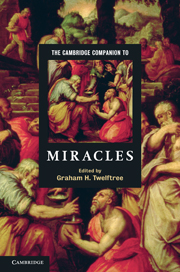Book contents
- Frontmatter
- Introduction
- Part I Fundamental issues
- Part II Miracles in antiquity and the Middle Ages
- 3 Miracles in the Hebrew Bible
- 4 Miracles in the Greek and Roman world
- 5 Miracles in Second Temple and early rabbinic Judaism
- 6 The miracles of Jesus
- 7 Miracles in early Christianity
- 8 Miracles In The Middle Ages
- Part III Miracles and major religions
- Part IV Miracle today
- Index
7 - Miracles in early Christianity
from Part II - Miracles in antiquity and the Middle Ages
Published online by Cambridge University Press: 28 May 2011
- Frontmatter
- Introduction
- Part I Fundamental issues
- Part II Miracles in antiquity and the Middle Ages
- 3 Miracles in the Hebrew Bible
- 4 Miracles in the Greek and Roman world
- 5 Miracles in Second Temple and early rabbinic Judaism
- 6 The miracles of Jesus
- 7 Miracles in early Christianity
- 8 Miracles In The Middle Ages
- Part III Miracles and major religions
- Part IV Miracle today
- Index
Summary
The supernatural gifts, which even in this life were ascribed to the Christians above the rest of mankind, must have conduced to their own comfort, and very frequently to the conviction of infidels.
Edward GibbonChristian apologetic found that appeal to miracles was by no means a trump card to play.
Geoffrey LampeThese quotations reflect two different perspectives on the importance of miracles for the Christian church in the period following the death of Jesus. For Gibbon they are one of five causes accounting for the rise of Christianity. For Lampe their importance can be overplayed for they constituted ambiguous evidence in favour of Christianity. Against such a background, this chapter will examine the character and nature of the miraculous in Christianity in the period running from the death of Jesus to the middle of the third century ce. The discussion will show that Christians moved in a world full of the miraculous. Miracles were taken for granted, although some scepticism about the phenomenon did exist, relating both to the factuality of the miracle/s described, but also to the character of the miraculous act. In this context, space will be given to the debate about magic and its definition, and the point will be made that every supposedly miraculous event could be construed, negatively, as magic. The miraculous emerges from this as something ambivalent, and it was a continuing problem for Christians to distance both their founder and other Christian miracle workers from the charge of being sorcerers. In the course of the discussion, I shall seek to show how there exist continuities between pagan discussion of magic and Christian engagement with the theme, particularly as this relates to its polemical use. The chapter will also address the question of the function of miracle. Emerging from all of this, there will be a discussion of the importance of miracle for the spread of Christianity
- Type
- Chapter
- Information
- The Cambridge Companion to Miracles , pp. 131 - 148Publisher: Cambridge University PressPrint publication year: 2011
- 1
- Cited by



